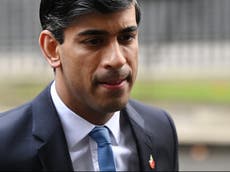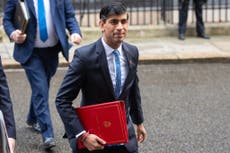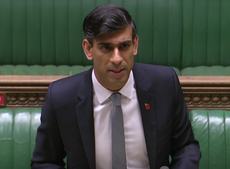Spending review: Chancellor promises to make jobs ‘number one priority’ in package for economic recovery from pandemic
Calls for chancellor to ditch ‘economic madness’ of public sector pay freeze

Your support helps us to tell the story
From reproductive rights to climate change to Big Tech, The Independent is on the ground when the story is developing. Whether it's investigating the financials of Elon Musk's pro-Trump PAC or producing our latest documentary, 'The A Word', which shines a light on the American women fighting for reproductive rights, we know how important it is to parse out the facts from the messaging.
At such a critical moment in US history, we need reporters on the ground. Your donation allows us to keep sending journalists to speak to both sides of the story.
The Independent is trusted by Americans across the entire political spectrum. And unlike many other quality news outlets, we choose not to lock Americans out of our reporting and analysis with paywalls. We believe quality journalism should be available to everyone, paid for by those who can afford it.
Your support makes all the difference.Rishi Sunak has promised to make jobs and livelihoods his “number one priority” in a spending review on Wednesday designed to inject momentum into the economic recovery from the coronavirus pandemic.
The chancellor will unveil a new £2.9bn Restart scheme to help 1 million long-term unemployed look for work, along with £1.4bn of new funding for JobCentre Plus and funding for continued support of apprenticeship and skills.
But Mr Sunak was coming under intense pressure to ditch his proposed pay freeze for 5 million public sector employees outside the NHS, a plan that was denounced by the Unite union as “economic madness” at a time when consumer spending is needed to revive the pandemic-battered high street.
Anti-poverty campaigners were urging him to deliver a reprieve for the £20 uplift in weekly benefit payments – introduced at the start of the Covid-19 outbreak and due to expire in April – that is regarded as a lifeline by millions struggling to get by.
And the chancellor was also coming under fire for a planned cut from 0.7 to 0.5 per cent of GDP in the sums allocated to international aid, amid fears that the change may become permanent rather than a one-year response to the crisis.
The 12-month spending settlement for government departments replaces a promised three-year review that was cancelled because of the difficulty of making long-term plans while the route out of the public health crisis remains unclear.
Mr Sunak had been planning to use the review to put flesh on the bones of Boris Johnson’s “levelling up” agenda, and Wednesday’s announcement is still expected to include ambitious plans for capital investment in new roads, houses, railways and cycle lanes designed to create and support hundreds of thousands of jobs across the country.
But the Institute for Fiscal Studies has warned that the expected splurge will pave the way for substantial rises in years to come in levies including income tax, national insurance and VAT, as the UK is forced to rein in borrowing which has left the national debt at over £2 trillion.
Putting the finishing touches to his 20-minute statement, Mr Sunak said: “My number one priority is to protect jobs and livelihoods across the UK.
“This spending review will ensure hundreds of thousands of jobs are supported and protected in the acute phase of this crisis and beyond with a multi-billion package of investment to ensure that no one is left without hope or opportunity.”
The spending review will confirm £1.6bn in funding for the next stage of Mr Sunak’s Kickstart scheme, which the Treasury says will create up to 250,000 government-subsidised jobs for young people, as well as the extension to the end of March of a £2,000 incentive for employers to hire apprentices, and a £375m package to support skills training.
The Federation of Small Businesses said that support for jobseekers was welcome but urged the chancellor to focus on measures to help firms create and protect jobs, such as a cut in employers’ National Insurance payments, the restoration of the £1,000 Job Retention Bonus for keeping on furloughed staff, and clarity on replacements for EU funding streams that will be lost in January at the end of the UK’s Brexit transition.
The CBI’s chief policy director, Matthew Fell, said it was right to focus on job creation, saying: “The scarring effects of long-term unemployment are all too real, so the sooner more people can get back into work the better.”
Mr Sunak’s Labour counterpart, Anneliese Dodds, said: “The chancellor’s irresponsible choices this year have wasted billions and have left us with the worst economic downturn in the G7 and record levels of redundancies.
“We now need a relentless focus on jobs and growth, and responsible choices to get the economy back on its feet again.”
The Unite union’s general secretary, Len McCluskey, called for “shot in the arm” investment in the economy to stimulate growth.
"2020 has been a disastrous year for jobs and incomes, so it is vital that we hear from the chancellor that there will be a massive effort, working with industry and trade unions, to make 2021 a year of job creation and income stabilisation,” said Mr McCluskey.
“We must at all costs avoid the prospect of mass unemployment that would scar our economy and the lives of thousands and their families for the foreseeable future.”
Also expected to be confirmed in the review are:
– An extra £3bn for the NHS to tackle a backlog in operations caused by the Covid-19 crisis;
– Confirmation of funding for 50,000 more nurses and 50 million additional GP appointments;
– Plans for a new national infrastructure bank and a northern campus for the Treasury.
The Liberal Democrat Treasury spokesperson, Christine Jardine, called on the chancellor to be more ambitious.
“For people worried about work now or facing continued exclusion from government support, investment in job centres is no replacement for a serious economic strategy to protect and create jobs,” said Ms Jardine.
“The country needs a radically new approach to the recovery that tackles deep-seated inequality, prioritises unparalleled infrastructure investment into the green economy of the future, and ensures no one is left behind.”
Meanwhile, NHS England’s chief executive, Sir Simon Stevens, said the Treasury had agreed to discuss a further funding boost in the new year to cover the ongoing extra costs resulting from the coronavirus.
The NHS has already been given a long-term funding settlement, but Sir Simon told a conference of NHS leaders that “two things have changed”.
“One is that obviously the health service is operating in a Covid environment where we've got extra costs,” he said. “And secondly, precisely because of Covid, there are other health needs that have arisen during the course of the pandemic.”
He added: “What we have agreed with the government is that they are putting in extra funding for some of those new health needs for next year, over and above the long-term plan, and they will continue to work with us on identifying what the extra Covid costs look like as we go into next financial year 2021-22.
“But the truth is, there's still quite a lot of uncertainty as to exactly what those costs will be and so we think we agree with them that it makes more sense to answer that question earlier in the new year.”




Join our commenting forum
Join thought-provoking conversations, follow other Independent readers and see their replies
Comments